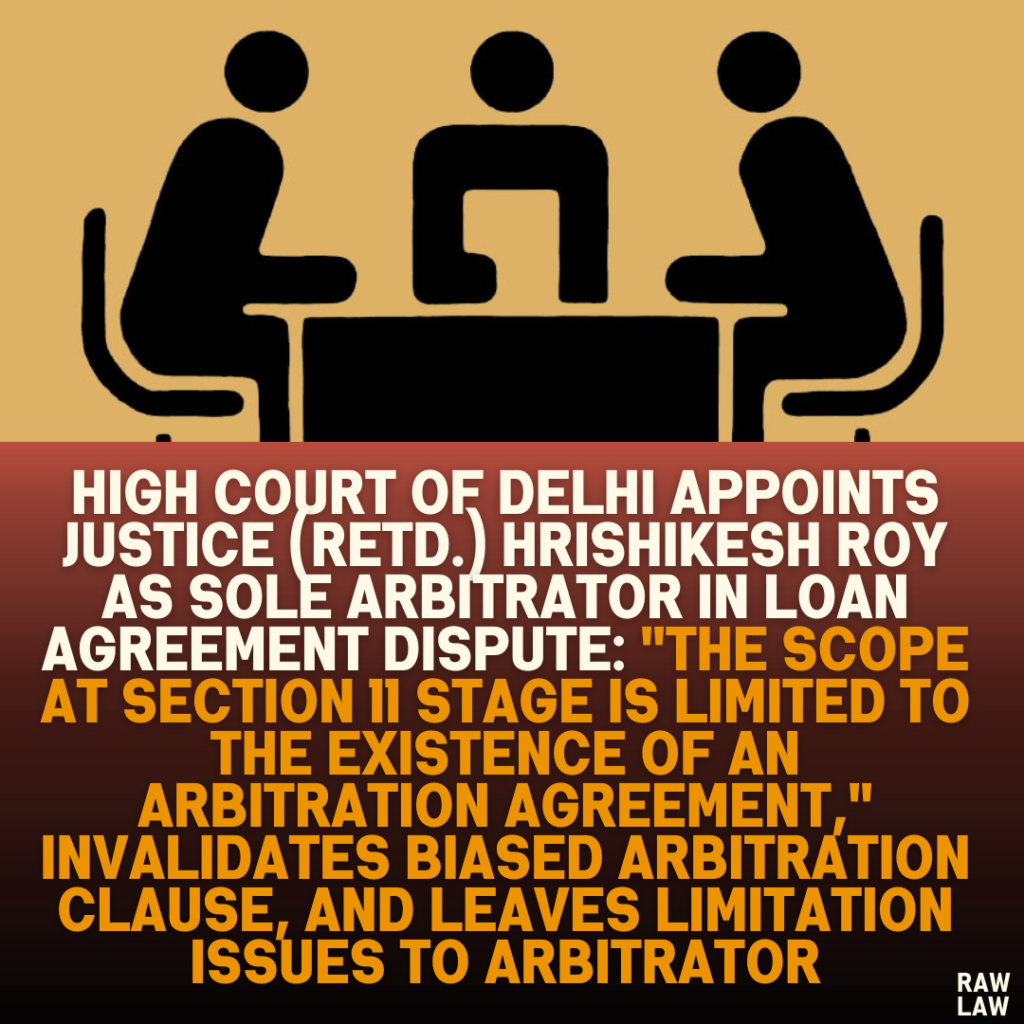Court’s Decision
The Delhi High Court appointed Justice (Retd.) Hrishikesh Roy, former judge of the Supreme Court of India, as the sole arbitrator to adjudicate disputes arising out of a loan agreement and deeds of personal guarantee. The court clarified that its inquiry under Section 11 of the Arbitration and Conciliation Act, 1996, is confined to verifying the existence of an arbitration agreement. The court noted that it cannot determine whether the claims were time-barred or arbitrable, as these issues must be left to the arbitrator.
Additionally, the court invalidated the arbitration clause in the agreement that named the Chairperson of the Technology Development Board or their nominee as the sole arbitrator, as it contravened the principles of independence and impartiality required for arbitration proceedings.
Facts
- Background of the Agreement:
- The petitioners and the respondent signed a loan agreement on July 18, 2012, for financial assistance of INR 960 lakhs to fund a project on nuclear radiation monitoring systems.
- The loan was to be disbursed in four tranches, each contingent upon achieving pre-defined project milestones.
- Timeline of Disbursements and Delays:
- While the first two tranches (INR 300 lakhs and INR 350 lakhs) were disbursed on time, the third tranche (INR 260 lakhs) was delayed by 2.5 years, despite the petitioners meeting all conditions.
- The delay caused severe financial distress, including cost escalations, diversion of project funds, client attrition, and revenue loss.
- Attempts at Resolution:
- After prolonged delays, the petitioners escalated the matter to the Minister of Science and Technology and sought relief, which resulted in further supplementary agreements extending deadlines and providing moratoriums.
- The petitioners claimed losses of INR 68 crores due to the delays, including reputational damages and loss of profits.
- Arbitration Demand:
- On May 22, 2024, and June 12, 2024, the petitioners invoked arbitration under the agreement.
- The respondent refused to cooperate, leading to the filing of this petition under Section 11(6) of the Arbitration and Conciliation Act, 1996.
Issues
- Existence of Arbitration Agreement:
Whether the arbitration agreements in the loan agreement and personal guarantee deeds were valid and enforceable. - Limitation and Arbitrability:
Whether the petitioners’ claims, based on delays from 2014-2016, were barred by limitation or arbitrable under law.
Petitioner’s Arguments
- Financial Losses:
- The 2.5-year delay in disbursing the third tranche caused significant financial and reputational damages to the petitioners.
- Project costs escalated by INR 155 lakhs, and client attrition resulted in a revenue loss of INR 2564 lakhs.
- Violation of Contract Terms:
- The respondent failed to adhere to the loan terms and ignored multiple recommendations from oversight committees to disburse the third tranche promptly.
- Right to Arbitration:
- The petitioners invoked arbitration under the agreement and sought the appointment of an independent arbitrator, citing the respondent’s failure to resolve disputes.
Respondent’s Arguments
- Time-Barred Claims:
- The respondent argued that the petitioners’ claims were barred under Article 137 of the Limitation Act, 1963, as they were raised eight years after the alleged delay in disbursement (2014-2016).
- Non-Arbitrability:
- Claims barred by limitation are non-arbitrable, as held in precedents like BSNL v. Nortel Networks (India) Pvt. Ltd.
- Judicial Intervention at Section 11 Stage:
- The respondent contended that the court should reject the petition outright due to ex-facie time-barred claims.
Analysis of the Law
The court relied on the principles laid out in SBI General Insurance Co. Ltd. v. Krish Spinning and In Re: Interplay Between Arbitration Agreements:
- Limited Scope Under Section 11:
- The court’s role is limited to verifying the prima facie existence of an arbitration agreement. Issues like limitation and arbitrability must be determined by the arbitrator.
- Judicial Non-Interference:
- Modern arbitration principles prioritize arbitral autonomy and minimal judicial interference to ensure efficient dispute resolution.
- Invalid Arbitration Clause:
- The clause naming the Chairperson of the Technology Development Board or their nominee as the sole arbitrator was invalid, as it violated the independence and impartiality standards for arbitration.
Precedent Analysis
- SBI General Insurance Co. Ltd. v. Krish Spinning (2024)
- Held that limitation issues must be left to the arbitrator and cannot be decided at the Section 11 stage.
- TRF Limited v. Energo Engineering Projects Limited (2017) and Perkins Eastman Architects DPC v. HSCC (India) Limited (2020)
- Reaffirmed the principle that arbitrators must be independent and impartial.
- BSNL v. Nortel Networks (2021)
- Claims barred by limitation are non-arbitrable.
Court’s Reasoning
- Existence of Arbitration Agreement:
- The court found the agreements between the parties to contain valid arbitration clauses.
- Limitation and Arbitrability:
- These issues were deemed outside the court’s purview at the Section 11 stage and left for the arbitrator to decide.
- Appointment of Independent Arbitrator:
- In line with the law, the court appointed an independent sole arbitrator, invalidating the contractual provision that allowed the respondent to nominate an arbitrator.
Conclusion
The court appointed Justice (Retd.) Hrishikesh Roy as the sole arbitrator to adjudicate disputes. It clarified that the arbitrator is empowered to decide all jurisdictional and limitation-related objections before proceeding with the merits of the case.
Implications
This judgment strengthens the principle of minimal judicial interference at the arbitration stage, promoting arbitral autonomy and efficiency. It underscores the importance of appointing independent arbitrators to ensure impartiality in the resolution of disputes. It also clarifies that limitation issues should be determined by the arbitrator, aligning with evolving principles of arbitration law.




Pingback: Delhi High Court Grants Bail to Accused in Alleged False Promise of Marriage Case: "Inducement or Deception Can Only Be Determined After Trial," Highlights Consent in Adult Relationships and Completeness of Investigation - Raw Law